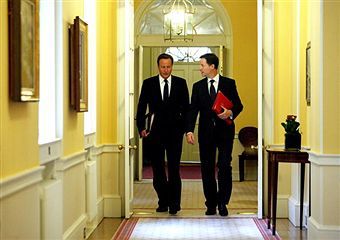 Amid all the excitement of the US midterms, a small, local ballot took place which has
important lessons for the UK’s referendum on the Alternative Vote – due to take place six months on Friday.
Amid all the excitement of the US midterms, a small, local ballot took place which has
important lessons for the UK’s referendum on the Alternative Vote – due to take place six months on Friday.
Like us, America uses the straightforward first-past-the-post voting system for its thousands of elected offices – from local school boards and sheriffs to races for governors’ mansions and the White House itself.
Their well-established primary system also gives voters a direct say in who the candidates should be – taking power away from the parties and making politicians more responsive to the demands of their local electorate.
Because US politics is dominated by two parties, winning candidates are generally guaranteed to have garnered a large share of the vote. In some states, however, a run-off election is held between the top two candidates if no one obtained 50 per cent of the votes in the first round.
In a handful of jurisdictions (a very small handful, in fact – just 0.5 per cent of the more than 3,000 counties in the US), they have tried condensing these two rounds into one by using instant run-off voting (IRV) – which is basically the Alternative Vote (AV) system being proposed in next year’s referendum here.
One of those places was Aspen, Colorado. Aspen residents voted in 2007 to use IRV for their mayoral elections (and a variation of it for city council races which needed to pick two winners). They held their first IRV elections on 5 May last year – and they did not prove a great success.
As the Aspen Times reported: ‘Some council members said they didn’t have enough confidence in, or an understanding of, the IRV process. As a result, it has opened the city up for liability and voter confusion.’ Even the city’s special counsel, who recommended the system, admitted that public education needed to be improved ‘because many voters didn’t know how to rank their candidates, or didn’t rank all of them, thus reducing their chances to participate in an instant runoff’.
Worse still, the complications involved in counting an IRV election caused some very worrying errors. The first pre-election test of the counting system was not conducted properly because the testers ‘lost patience’.
In a second test, it was discovered that the computers were counting the results backwards. And in the election itself, the winning candidate was declared with the wrong number of votes – an error that wasn’t pointed out to the electorate until three weeks after polling day. (An in-depth investigation by the local paper is worth reading in its full, sorry detail here.)
Amid such controversy, it’s not surprising that a non-binding measure put to voters six months later showed a narrow majority in favour of scrapping the new voting system. This year, after a full review, Aspen voted by a two-to-one margin to get rid of IRV and return to the system they used before. Even the Mayor and council members who had previously supported the IRV experiment joined the calls to ditch it.
Aspen therefore joins a number of US cities – like Ann Arbor, MI and Burlington, VT – who have tried IRV and subsequently dropped it. Along with the recent news from Fiji and Australia that two of only three countries in the world which use AV for their national legislatures are keen to get rid of it, British voters might well ask why this obscure and complicated voting system is being proposed for our national Parliament; especially by politicians who’ve previously criticised it.
Perhaps the wisest words of caution come from the Aspen resident who told his local paper:
‘A lot of people, including myself, didn’t understand the intricacies of IRV when we were voting for it’.
It’s my job – and that of the No campaign http://no2av.org/ I’m leading – to make sure that British voters can’t say the same next May.
Matthew Elliott is the Campaign Director of NO2AV
You can find out more about the No campaign, and sign up to help, at www.no2av.org






Comments